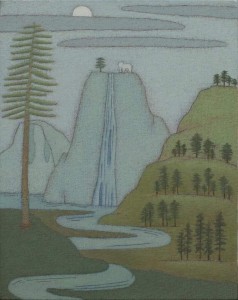
题图 / John Dilg
雨蛙溪
到六月我们的小溪便停止了歌唱
找寻很久之后,才会发现
它要么早已在地下黑暗中摸索
(带着各种各样的雨蛙
那欢声在五月的薄雾中还能听见
像诡异雪天诡异的雪橇铃声)——
或者一蓬一蓬在凤仙花丛中冒出
水面上,无力的树叶喘息、翻卷
甚至向着水流相反的方向飘去
河床干了,仿佛一张褪色的纸
枯叶因为热气全粘在一起——
只有记得它的人才知道这是条小溪
可见,它远远不如
歌中所唱的别处的小溪
我们爱所爱之物因其是其所是
作者 / [美] 罗伯特·弗罗斯特
翻译 / 徐淳刚
Hyla Brook
By June our brook‘s run out of song and speed
Sought for much after that, it will be found
Either to have gone groping underground
(And taken with it all the Hyla breed
That shouted in the mist a month ago
Like ghost of sleigh bells in a ghost of snow)---
Or flourished and come up in jewelweed
Weak foliage that is blown upon and bent
Even against the way its waters went
Its bed is left a faded paper sheet
Of dead leaves stuck together by the heat---
A brook to none but who remember long
This as it will be seen is other far
Than with brooks taken otherwhere in song
We love the things we love for what they are
Robert Frost
在面对自然或人生秩序时,“黑暗”、“诡异”、“无力”、“喘息”的时刻比比皆是,大多数人都会经历一个又一个平原期,博弈或孕育,靠断断续续地输入,换回艰难险阻地输出。
弗罗斯特在这首诗中,明面写燠热的六月雨季里一条溪流的命运,但内里却渗着对“自我”秩序的坚定——即使在每个不为人知的小角落里都塞上期待,当“远远不如歌中所唱的别处的小溪”的时候,还能够欣然说一句,“我们爱所爱之物因其是其所是”。
什么都没发生,很大概率就是发生在我们身上的每件事。解除了对于戏剧性的迷恋,才能获得真正的自由。
荐诗 / 武萌萌
2020/06/28
第2668夜
Published 2020/06/28
Last updated: 2020/06/28

近期评论